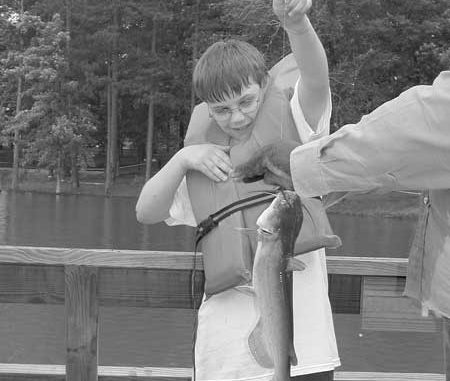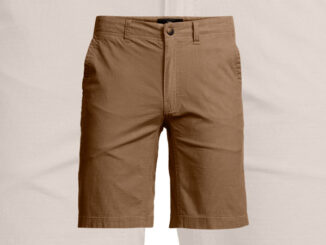
This Father’s Day, remember that many of life’s most valuable lessons are learned on the water.
Some of the most-important life lessons I ever learned, my dad taught me in boathouses while we fished, usually with the rain pouring down.
My dad never broke his word. If he had promised me we’d go fishing, we did, regardless of the weather. In those times, anglers fished from hand-hewn wooden johnboats they rented for $1 per day, and supplied their own motors to power the boats. They used dog food cans to bail the ever-present water from the leaky boats’ bottoms.
Often while I watched a bobber sitting next to a piling and the bream under the red-and-white float trying to determine whether or not they wanted to take the red wiggler on the hook, Pop would ask, “Son, what would you like to be when you grow up?” I’d always answer, “a fireman,” “a policeman,” or “the President of the U.S.”
Pop would pause before telling me, “Son, I don’t care what you grow up to be as long as you’re the best you can be. I’ll be proud of you if you’re a garbage collector. Just be the best garbage collector.”
Later, as I became a man, and we went on other fishing adventures, Pop always would emphasize that, “All I want for you, is for you to be the best you can be.” I didn’t understand the power, the wisdom and the impact of those words for many years.
However, even after Pop’s passing, that idea of doing my best remained the focus of my life. The wisdom of Pop’s boathouse challenge meant that I constantly attempted to do and become all I could, not realizing that to become all I could was a never-ending quest. Success would occur all along my journey, and not just at the final destination.
The Garbage Man
A few years ago while at a national bass tournament, I met several Japanese competitors, one with a fine Skeeter bass boat. When I asked his buddy about what the bass boat had cost, he answered in broken English, “about $40,000.”
Then I inquired what would he do with the boat when he returned to Japan. The gentleman from across the ocean smiled and said, “He’ll put it in a container and have it shipped back home on an ocean-going vessel.”
Now very intrigued, I asked, “How much will he have to pay to ship a bass boat and trailer in a container back to Japan?”
The Japanese fellow smiled again and said, “$40,000.”
Then I had to question, “How can your buddy pay $80,000 to buy a bass boat in this country and then ship it back to Japan? What does he do for a living?”
“Why, he’s a garbage man,” the Japanese fisherman told me.
When I tried to decide how a garbage man could afford to spend $80,000 to get a brand-new bass boat home, the angler enlightened me by saying, “There’s only five garbage companies in Japan, and my friend owns one. Garbage is a very good business in Japan.”
As I walked away, shaking my head in disbelief, I remembered the lessons Pop had taught me on rainy days in boathouses. I recognized the truth in my dad’s words when I met a garbage man who had become the best garbage man he could.
My Son’s Experience
I had learned from my dad that time spent fishing provided an opportunity for parents to teach children life lessons. I used fishing as a vehicle to pass on Pop’s lessons of life to my son, John. Now that John’s a man, a teacher and a coach, he knows from experience the importance of parents using outdoor activities to teach their children life lessons like he learned.
Here’s his suggestions in his words.
• “Don’t waste any chance to spend quality time with your children. I always knew when I was a kid that the days when the weather was bad and the fishing was slim meant one thing, boathouse fishing — the same way my granddad took my dad when he was a boy.
“Dad never wasted an opportunity to spend time with me and teach me outdoor lessons. Sometimes this meant sitting inside a boathouse discussing the key issues of life, love and morality. I never felt threatened or nervous about opening up to my dad on these trips because of the subtle ways he brought up key topics about events happening in my life.”
• “Realize that school isn’t the only place lessons are taught and learning takes place. I always knew Dad and I would be heading on an adventure when he’d send me to school with a letter informing my teachers about the ‘Phillips’ Family Enrichment Trip’ to pursue an outdoor education.
“Although our family enrichment trips didn’t occur too frequently, my dad and I both expected for me to learn more with him on the water than I would in a classroom. An outdoor outing gave Dad guaranteed time on the water to talk with me about my life and my future.”
• “Respect for all that’s wild was one of the first lessons I ever learned in the outdoors. Dad taught me that no matter how many fish I caught, how late the hour or how dark the night, I needed to respect nature and take responsibility for the fish I’d caught by not leaving a fish uncleaned or unreleased.
“My dad always considered fishing a privilege, and he mandated that I respect the outdoors and never waste anything I caught.
• “Teach your children how to get the backlashes out of their lives.
“Dad didn’t get to cast much when we went fishing. Mostly he spent time untangling the backlashes in my fishing line. He never got upset or angry and used this same tactic in raising me. The same patient way he helped me with the backlash in my reel he also used to help me navigate the tangles of adolescence.
• “Help your children understand that good behavior can make or break them. Discipline was a big part of my childhood growing up, but I hated none of the punishments as much as losing fishing privileges for misbehavior.
“Once I went with Dad and one of his friends jug fishing. Since I wasn’t on my best behavior and didn’t help the way I should have, I was suspended from fishing for a few months after the trip.
“Dad told me, ‘Son, when you go on a trip, you have to be on your best behavior, or else you won’t go again any time soon.’ That punishment was far worse than any whipping I ever got.
• “Reinforce the importance of obedience. I enjoyed nothing better than catching fish with my dad, cooking those fresh fish on the creek bank and eating them.
“As I watched the fire one night after a fishing trip, Dad told me to stay away from the hot grease in the skillet. Of course, I didn’t obey, I got too close, and grease popped into my eyes. I learned to heed Dad’s words of wisdom to stay out of trouble.
• “Show your children how to find a life, not just a job.
“Generally my future and my career vocation weren’t discussed in school or in key meetings at home but rather in the comforts of a boathouse or on the fiberglass deck of a bass boat. My dad helped me find my direction in life and always told me that if I could find a job I loved doing, then I’d never have to work again. I took Dad’s recommendation to heart, and discovered the perfect job for me.
• “Don’t waste a good opportunity for talking with children about sex when you’re already outside with the birds and the bees. One of the most-awkward times for parents is their discussions with their children about sex.
“However, discussing these difficult issues on the water seems natural. Dad and I talked about love and marriage and how to find the right life partner. I never was nervous or embarrassed by our conversations because I knew that what we talked about on the water stayed there.
• “Teach the ties that bind. As I grew older, I went through a time when sports and girls took some of my time away from fishing and spending time in the outdoors with my dad. But I knew I always could call Dad for a quick trip down to the lake to talk about issues that concerned me.
• “Teach your children how to find the best marriage partner. My dad taught me that finding the right person to marry was like weighing in the winning catch at a fishing tournament. You have to cull a lot.
Dad explained, ‘Son, when you’re searching for that special someone, look beyond beauty, and see what’s in her heart. Don’t fall in love with anyone just because she looks good, and has the best sugar. The person you marry must be willing to support you no matter what, and you have to do the same for them. Never settle for a catch you think will win. Always know when you go to the scales or the altar that you’ve got a winning catch.’
“Today I’ve found that special someone, and Dad was right. I didn’t have to settle for second best.
“Now I have a daughter of my own, and one day I’ll take her fishing on rainy days to boathouses and teach her the lessons I learned as a child from my dad that he learned from his dad.”


